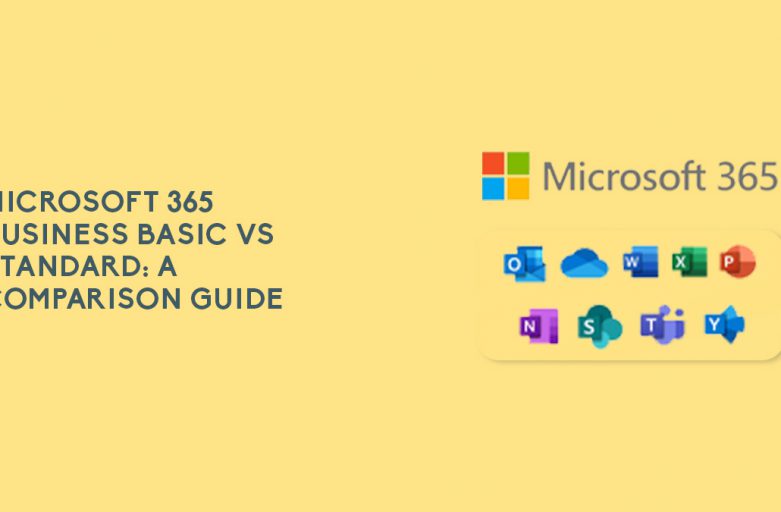
What do you need to consider when choosing between Microsoft 365 business basic vs standard?
- Applications and services included
- Teamwork and communication
- Email and calendaring
- File storage and sharing
- Security and compliance
- Support and deployment
- Tools to build and manage your business
Microsoft 365 is a subscription plan that allows your business to access Office apps, online storage, and other productivity and collaboration tools. The advantage of a subscription is that you’ll always have the latest features, fixes, security updates, and ongoing tech support. Additionally, you can also settle your payment on a monthly or yearly basis. Best of all, you can decide from the various subscription plans available. In this article, you will learn about two of them — the Microsoft 365 Business Basic and Standard. Keep on reading!
Applications And Services Included

Microsoft 365 includes the Office desktop apps that you might be already familiar with. But along with that, you also get applications and services that can improve your teams’ collaboration and productivity in the workplace.
Here is a comparison of the applications and services that you can access with the Business Basic and Business Standard plan:
| Business Basic Plan | Business Standard Plan |
| Word* Excel* PowerPoint* Outlook* Teams Exchange OneDrive SharePoint *These applications are only available in web versions. | Word* Excel* PowerPoint* Outlook* Teams Exchange OneDrive SharePoint Access (PC only) Publisher (PC only) *These applications are available in both web and desktop versions for Windows and Mac. |
Teamwork And Communication

Microsoft 365 for business can greatly improve the teamwork and communication of your workforce. Both basic and standard subscription plans allow you to host online meetings and video calls for up to 300 people, chat with your team, connect and collaborate in one place, and create team sites to share information and content.
The main difference is that the Business Standard plan has a feature that lets you host webinars with attendee registration pages and email confirmations. While in an ordinary meeting, the focus is on discussion and sharing, webinars are more controlled. You’ll have presenters that share their ideas and an audience or attendees.
Email And Calendaring

Both the Microsoft 365 Business Basic and Standard offer the same features when it comes to email and calendaring. This includes email hosting with a 50 GB mailbox, permission to use custom domain names, and access to business-class email with the Exchange app. Both plans allow you to manage your calendar, schedule meetings, share available meeting times, and more.
With Exchange, you have a focused inbox that allows you to prioritize messages, so you can do your work smarter and more efficiently. You also have the option of customization with add-ins. This is available for phones, tablets, desktops, and the web.
File Storage And Sharing

Are you having trouble working on files across multiple devices? The good news is, both the Microsoft 365 business basic and standard come with useful features for file storage and sharing. For starters, you get 1 TB of OneDrive storage. When you save a file to OneDrive, you can access it on your synced devices. You can add more storage as you need or cancel it in the future.
Sharing files with other people is also made more secure because only those with permission can access them. You can choose to share files with external contacts through guest links.
Security And Compliance

Speaking of security, both subscription plans can provide protection to your email with Exchange Online Protection. This is a cloud-based filtering service that will help shield your business against spam, malware, and email threats.
First, the reputation of the sender of an email is inspected to reduce spam. Then the email is scanned for malware and sent to quarantine if one is detected. After that, the message will go through your set mail flow rules. Lastly, it goes through content filtering to detect signs of spam, phishing, and spoofing. Microsoft 365 Business Basic and Standard comply with international and industry-specific security and privacy standards.
Support And Deployment

One of the advantages of subscribing to Microsoft 365 for business is the access to continuous support. With both subscription plans, you get around-the-clock phone and online support. On top of this, you don’t have to worry about downtime because Microsoft can provide a 99.9% financially backed uptime guarantee.
When it comes to deployment, both subscription plans allow you to have a maximum of 300 users, which is suitable if you have a small business. For additional users, you may subscribe to Enterprise plans.
Tools To Build And Manage Your Business

With Microsoft 365 Business Basic and Standard, you can plan schedules and daily tasks to better align your team. Use the Microsoft Lists to organize work. To know what your employees and customers are thinking about, you can also use Microsoft Forms to gather feedback which can help your business.
One advantage of subscribing to the Microsoft 365 Business Standard is that you can also use Microsoft Bookings, which makes it more convenient for your clients to schedule appointments.
Key Takeaway
Microsoft 365 can provide you with apps and services that can increase your team’s productivity and improve collaboration. By considering the similarities and differences, you can pick between Microsoft 365 Business Basic and standard.
If you’re looking for IT solutions for your business, you can contact us here at CT Link. We can help you choose the products and services that will fit your organization’s needs.

